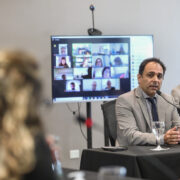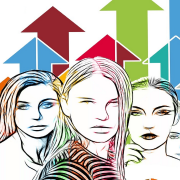Equal Pay Day: Equal pay for equal work? Same task?
On April 9, the equal pay day between men and women was established in our country. As of today, we have large gender gaps that are far from closing.
“Below, we offer a google translate version of the original article in Spanish. This translation may not be accurate but serves as a general presentation of the article. For more accurate information, please switch to the Spanish version of the website. In addition, feel free to directly contact in English the person mentioned at the bottom of this article with regards to this topic”.
Women charge less than their male peers. That is a fact. What’s more, transgender people also get even less, or are directly excluded from the labor market. On March 16, the National Directorate of Economy, Equality and Gender of the Ministry of Economy of the Nation presented the report “Gender gaps in Argentina: State of situation and challenges“. There, it is evident that the total income gap between men and women (calculated as the relative variation between the average income of men and the average income of women) is 29.0%, and it widens for female employees. informal, reaching 35.6%.
So, we can say that the same is not charged for the same tasks. But we can also ask: do we perform the same tasks as men and women? The tasks that women mainly perform within the home, and that correspond to reproductive work, have historically not been considered as such and, therefore, have not been remunerated. The incorporation of women into the labor market has not generated a fairer distribution of domestic and care tasks within the home. Women are still responsible for most of these tasks and spend almost twice as much time as men, even when they work outside their homes. Situation that deepens if they study or if they participate in spaces of activism and / or militancy. In other words, they work double and triple days, but they earn less than their male counterparts. And there the inequality appears before our eyes.
Feminisms and women’s movements and sex-gender diversities and dissidents have been thinking about these gaps for a long time. The sexual division of labor, glass ceilings and walls are some analysis tools that have been developed to understand this unequal reality. To understand and transform it.
Today, the idea persists that women have a natural instinct to care. Jobs that involve care and are mostly performed by women are the worst paid. Gender stereotypes are in order in job interviews, tenders, and promotion and responsibility decisions. Men are not obliged to reconcile their life at home with work outside of it, women are. Women see their possibility of training, improvement and job promotion diminished (a phenomenon called the “glass ceiling”) in the years they have children in their care. Boys don’t. The law grants women longer work licenses to care for sons and daughters. But far from being a privilege, the latter not only results in discrimination when hiring or considering a woman for promotion. It also reinforces the stereotypes of a mother woman and a father only as a provider for a typical family, which should not take care of children under their responsibility.
Women not only earn less, but are forced to spend more. There is what is known as the “tax pink”. The market offers products that are directed towards women and that are ostensibly more expensive. These products range from a deodorant, a razor to a medicine, such as ibuprofen “fem”. However, they fulfill the same functions as for men. There is no factual difference to support a different price. Only stereotypes that oppress and harm women culturally and economically are reinforced. Likewise, the sexual and (non) reproductive health of cis women, trans people and any menstruating body is affected with the absence of public policies that transform free access to elements for menstrual management into a right.
Particularly, within the current conjuncture of the Covid-19 pandemic, it can be considered a hinge, break moment in global society. Not only in the ways of functioning of the economy and the way of executing the different interpersonal relationships, but, in turn, the veil is drawn on the multiple tasks of care performed by women. These are unpaid work. Thanks to this, it is that the man can enjoy a great wealth of time that allows him to train, get better jobs and have time for leisure.
All this reinforces the inequality that doubly affects women. First, because they work for their families for free, given the naturalization of this work due to the requirement of gender stereotypes. And second, they are subtracted from the time to access, like the men, spaces for training, leisure and self-care.
Along these same lines, we must not forget that the World Health Organization considers gender violence as a social epidemic. The Observatory “Women, Dissidence and Rights” of the Women of the Latin American Matria-MuMaLá reported that since March 12, the day the first measures of social isolation began, as of April 3, 15 femicides were registered.
Lastly, we celebrate the preparation of the report on gaps by the National Directorate of Economy, Equality and Gender of the Ministry of Economy and we urge the State and the private sector to produce and put into action, together with civil society, public policies tending to close gender gaps. This can only be achieved with the elimination of gender stereotypes, inclusion in the measurements of LGBTIQ + people, analysis of the economy with a gender perspective, democratization of care and the participation of women, gender and diverse and dissident sexes in the elaboration and decision making on those policies.
Authors
- Ivana Sanchez
- Constance Attwood
Contact
- Cecilia Bustos Moreschi, cecilia.bustos.moreschi@fundeps.org











